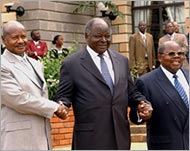African summit to have peace focus
Heads of state from 11 African countries are to meet in Tanzania to discuss a long-term solution to a decade of conflict in central Africa’s Great Lakes region.

The two-day summit starting on Friday is intended to secure lasting peace and promote development in the region, where millions died in the 1990s from war, genocide and turmoil.
“This meeting will go beyond pure rhetoric. The leaders will sign a decree and there is going to be a concrete action plan and people will monitor its implementation,” George Ola Davies, spokesman for the organisers of the conference, run jointly by the UN and the 53-member African Union (AU), said.
South African President Thabo Mbeki and Nigerian President Olusegun Obasanjo, also current AU chairman, are to join leaders from Angola, Burundi, the Central African Republic, the Republic of Congo, the Democratic Republic of Congo (DRC), Kenya, Rwanda, Sudan, Tanzania, Uganda and Zambia in Dar es Salaam.
Uganda, Rwanda, Burundi and Sudan were already embroiled in civil wars, but violence mushroomed in the region after the 1994 genocide in Rwanda, when 800,000 Tutsis were slaughtered by Hutus in a 100-day killing spree.
Fragile peace
Ethnic conflict spread after peace was restored in Rwanda when millions of refugees fled into neighbouring Burundi and the DRC.
 |
|
Leaders from Uganda (L), Kenya |
Rwanda invaded the DRC in 1996 and 1998, to hunt down Hutu rebels that fled after taking part in the genocide, it said.
Transitional governments in Burundi and the DRC are struggling with fragile peace deals and hoping to lead their countries to 2005 elections.
Meanwhile, Uganda and Sudan are trying to end civil wars that have lasted 18 and 22 years respectively.
But leaders are being called to look beyond securing peace towards promoting democracy, good governance and development.
“Such ambitious objectives require an iron will. It demands a steadfast determination to turn your backs once and for all on the evils of division, domination and confrontation,” Ibrahima Fall, special representative of UN Secretary-General Kofi Annan to the Great Lakes region, said.
Empty promises
Leaders are expected to sign a document known as the Dar es Salaam Declaration that specifies goals which foreign ministers from the nations have been drafting this week.
|
“There are a number of agreements that are already in place and if people stuck to these, it would help lead to Jim Terrie, |
Dar es Salaam means the House of Peace in Arabic and Swahili.
Other analysts also welcomed the meeting, but warned that leaders had made many empty promises before and must be pressured to keep them.
Jim Terrie, senior analyst at the International Crisis Group, said: “There are a number of agreements that are already in place and if people stuck to these, it would help lead to peace and security.
He added: “Specifically, what they are not doing is using their influence over a number of belligerents to stop their activities that are blocking peace and security.”